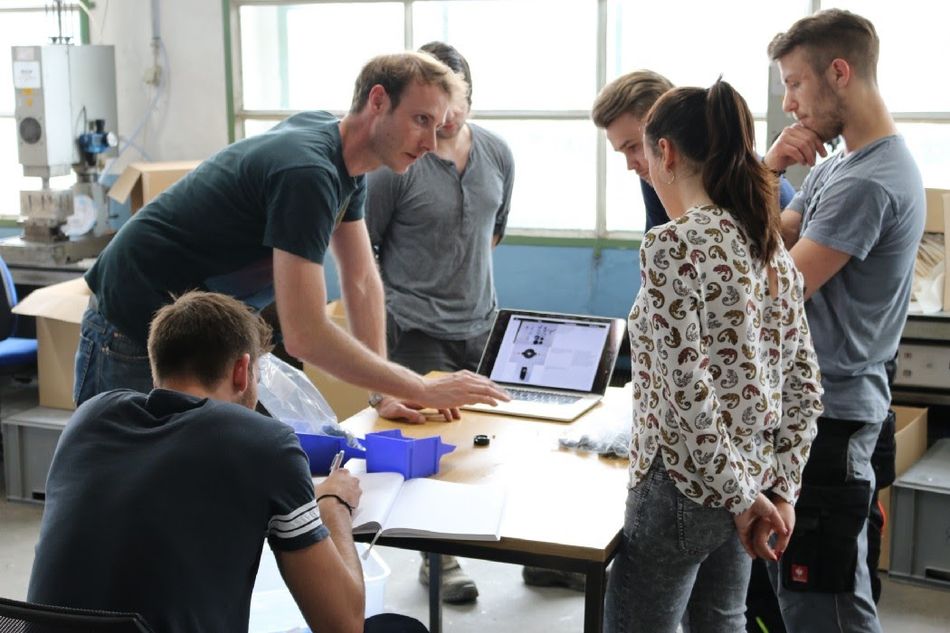Cloud manufacturing ushers in next-generation of hardware companies
Why the hardware market is ready for more players, greater agility, and a re-focus on product design.

Tags
The path to product development and manufacturing is undergoing a massive shift, ushering in a new generation of hardware companies. This new era—part of the fourth industrial revolution—is enabled by new technologies, such as artificial intelligence (AI) and cloud manufacturing, and is defined by greater production and logistic agility, an increased focus on product design, and a lower cost barrier for startups and small businesses.
Today, an increasing number of hardware companies are turning to cloud manufacturing and intelligent processes to boost their efficiency and gain a competitive edge. As we’ll see in this article, a new manufacturing philosophy and cutting-edge production practices are changing the nature of how companies develop and make hardware products for the better, emphasizing what really matters: the end product and the consumer.
The state of hardware startups
Next-gen hardware startups are popping up in a market that was until just recently dominated by large players. Interestingly, some of the most innovative of these big companies—most notably Apple—have contributed to the new startup-friendly environment by demonstrating that a technology hardware company does not have to be a manufacturer. By outsourcing its production to highly specialized manufacturing partners, Apple has kept its focus on design and marketing—a strategy that has paid off.
That the number of hardware startups is now on the rise is no coincidence. Inspired by the design-first approach demonstrated by Apple and others, and enabled by cloud manufacturing, the advancement of IoT and robotics, and digital manufacturing techniques like 3D printing and CNC machining, hardware startups are finding that there is more room in the market for new players and new ideas. No longer kept on the sidelines due to supply chain access and manufacturing resources, hardware startups are clearly demonstrating what they can bring to the table. Looking at the big picture, there is much to gain from the emergence of next-gen hardware companies and startups, including fewer cost barriers, more competition, and ultimately, better product design.
Democratizing the supply chain
Traditionally, startups and smaller hardware companies have struggled to get their foot in the door with top-tier manufacturing and supply chain partners. This has given larger companies with more resources a significant competitive edge in the market. If you think about it, this dynamic does make sense or at least it used to. Following the economy of scale, it was beneficial for the most advanced manufacturing and logistics partners to work with customers with the largest production orders.
However, with the proliferation of cloud manufacturing, this dynamic is evolving and companies with fewer resources and smaller production scales are gaining access to high-quality manufacturing services. Thanks to cloud-based connections and digital manufacturing, these companies can now work with qualified manufacturing partners from prototyping to final production, leveling the playing field with larger companies that have more established supply chains. In the end, cloud manufacturing is helping to democratize hardware product development, breaking down access barriers, and, as we’ll see in more detail, creating an environment where companies must differentiate themselves based on their product, not their manufacturing capabilities.

Product development
There has never been a shortage of innovative ideas for hardware products. Where the challenges to product development take shape is when you consider resources and skills. That is, while you may have an ingenious idea for a new product or solution, you must have the capabilities to bring it to fruition. Historically, this has benefited companies with the extensive resources to take ideas from concept to production.
With cloud manufacturing and external production partners, smaller hardware companies and even individuals can see their ideas through without requiring the specific skills needed for rapid prototyping and production processes. In other words, a company’s production capabilities and skills no longer dictate what types of products they can realize. Instead, manufacturing becomes a means to an end, and product design rightfully takes center stage.
By focusing more on designing products and handing overproduction to manufacturing services, hardware companies can also benefit from skills they may never have had. Because they have access to more production methods through cloud manufacturing, businesses can think outside the box for their designs and decide on the best production technique to meet the design requirements, not vice versa. For example, a hardware company designing a product to meet the specifications of CNC machining may miss opportunities that designing for 3D printing would have enabled. By putting design back at the forefront, superior products can be brought to market.
Product and consumer-focused
In a similar vein, by choosing to work with external production partners through cloud manufacturing, hardware businesses can remain agile in terms of the production techniques and materials they use. The obvious benefit of outsourcing in this way is, of course, cost. Cloud manufacturing does not require hardware startups to invest significant capital in manufacturing equipment, as well as pay for associated operation and maintenance. Instead, the business pays for the service of having a product professionally made.
An equally interesting benefit of this dynamic is that it gives hardware companies the freedom to develop products using different materials and manufacturing processes. By untethering itself from a single production capability or single material, a hardware company can achieve new levels of agility in its product development, taking advantage of new manufacturing methods and machines as well as different materials. This freedom allows more room for creativity in the product design stage, which in turn can lead to innovative and outside-the-box solutions.
 Customer focussed hardware companies are more agile and resilient. Image credit: LUUV.
Customer focussed hardware companies are more agile and resilient. Image credit: LUUV.Building a talent-based team
When it comes down to it, the most important assets for a hardware startup are its team members. While hardware startups and companies were once restricted to a fairly localized pool of candidates, new technologies are allowing businesses to hire purely based on talent, not location. Thanks to solutions like video calling and collaboration-focused design software, hardware companies can assemble diverse, highly skilled teams from around the country or the world, and work remotely to bring new products and solutions to life. In other words, if the best candidate for a particular position lives across the country, it is possible to onboard them without requiring a logistically complex and costly relocation.
Cloud manufacturing also supports this new way of working by eliminating in-house prototyping and production and alleviating the need for a physical, centralized workspace. In this sense, hardware startups can work remotely to design new products and connect with an external production partner for their prototyping and final production needs, all without requiring a physical production space and office. This, of course, inevitably cuts back on operational costs and streamlines budgets. That’s not to mention the other benefits of remote work we are seeing, including greater productivity and flexibility.
Adapting to the next generation of hardware
One of the greatest advantages of this new cloud-driven era of hardware manufacturing is that no one needs to be left behind. Hardware startups are empowered by this new production strategy and existing hardware companies reliant on legacy systems can also integrate cloud manufacturing to streamline their product development.
Cloud manufacturing company KREATIZE can facilitate this transition, showing hardware companies how they can adopt cloud manufacturing in strategic ways and refocus their business on their core capabilities. The Germany-based company is also primely positioned to support hardware startups as they build their cloud manufacturing networks and find trusted manufacturing partners. As a startup itself, KREATIZE understands the challenges new companies face and has developed solutions to alleviate and overcome them.
This article was written with contribution from Tess Boissonneault.
References:
Search for articles and topics on Wevolver
Tags